02.
Navigating the Gap: Mainstreaming Capacity Building
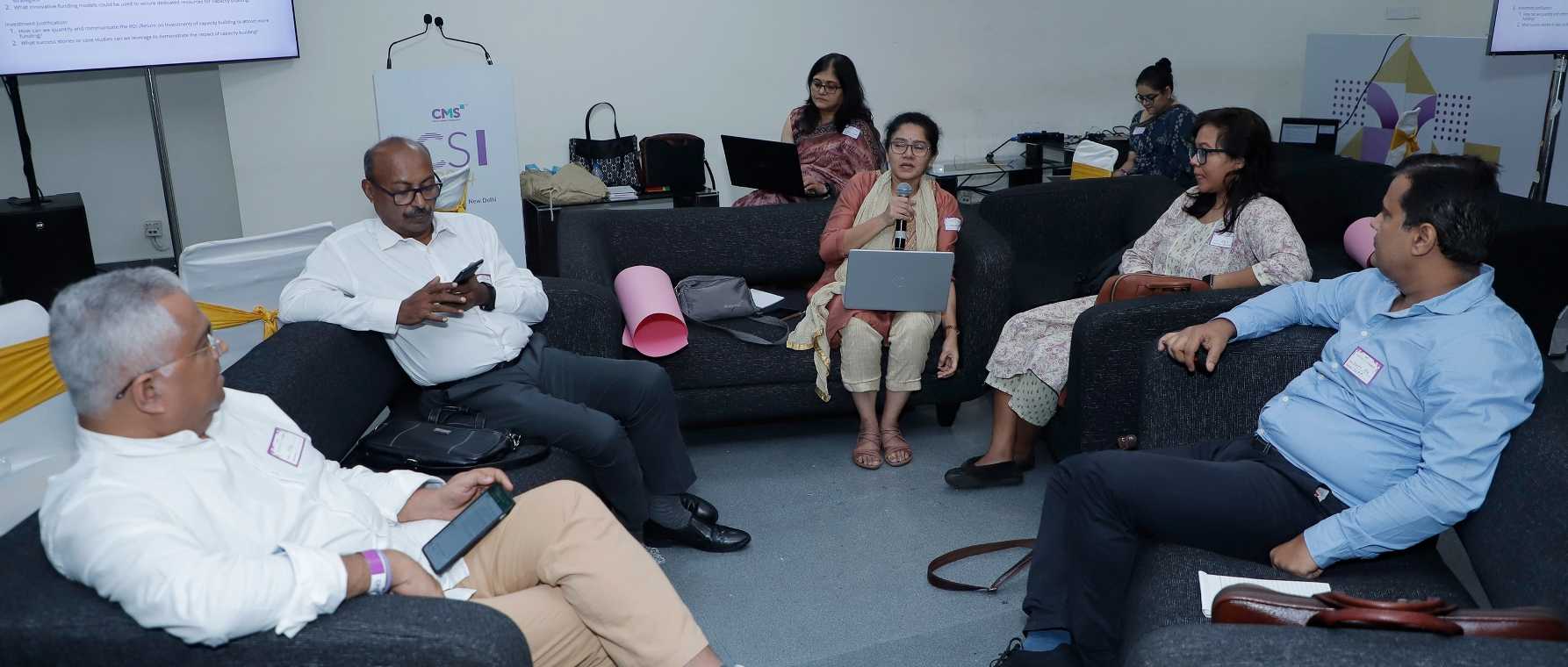
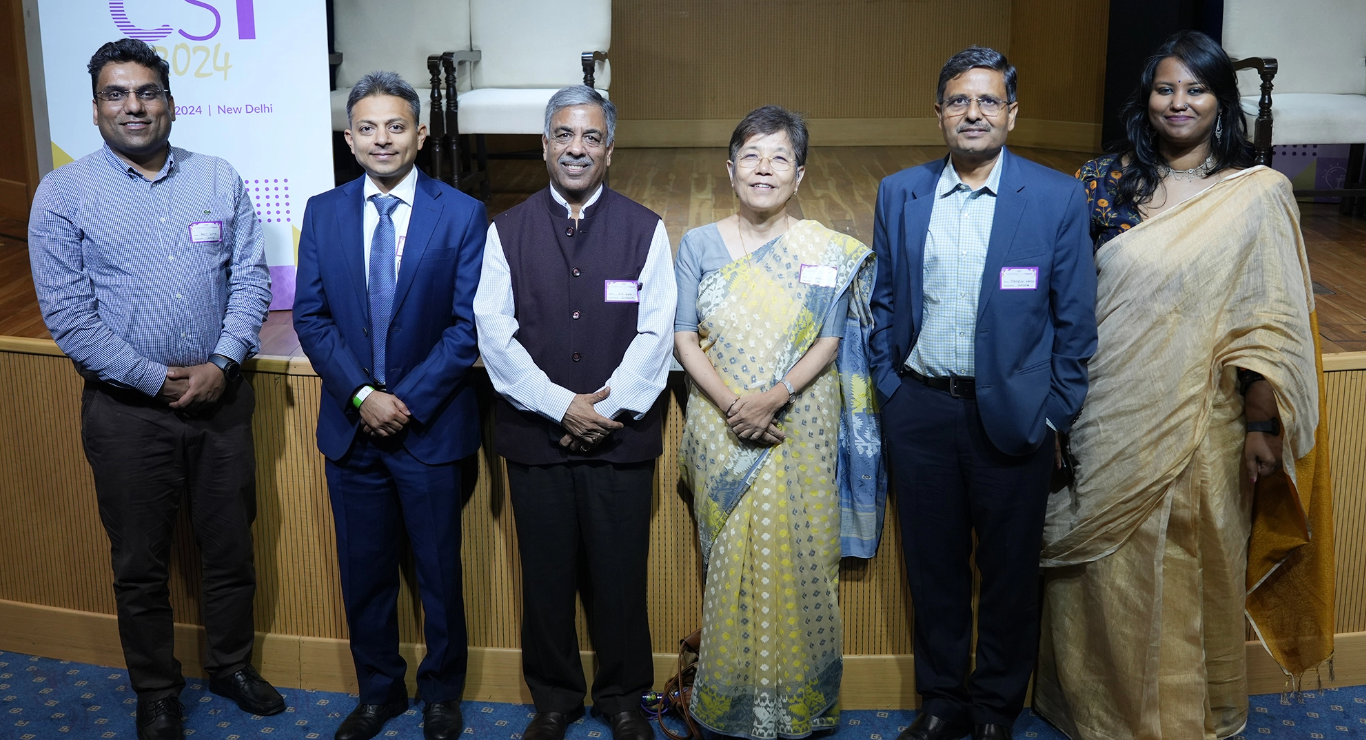
The theme of implementation and quality and fidelity in the CSI sessions focused on connecting, solving, and catalysing social impact initiatives.
In terms of mainstreaming capacity building, the discussions revolved around finding a balance between expected outcomes and real challenges, such as addressing community needs and being innovative in approaches. The role of frontline workers as critical contributors to impactful outcomes at scale was also underscored, along with the need for customizable and scalable solutions supported by partnerships and data-driven decision-making.
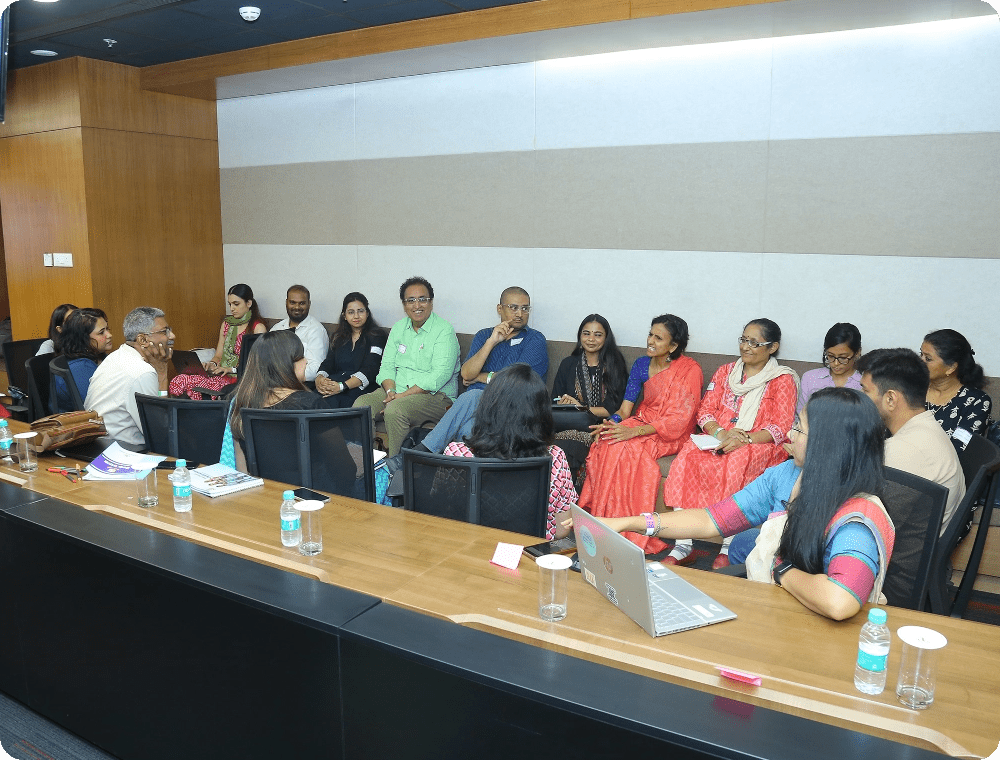
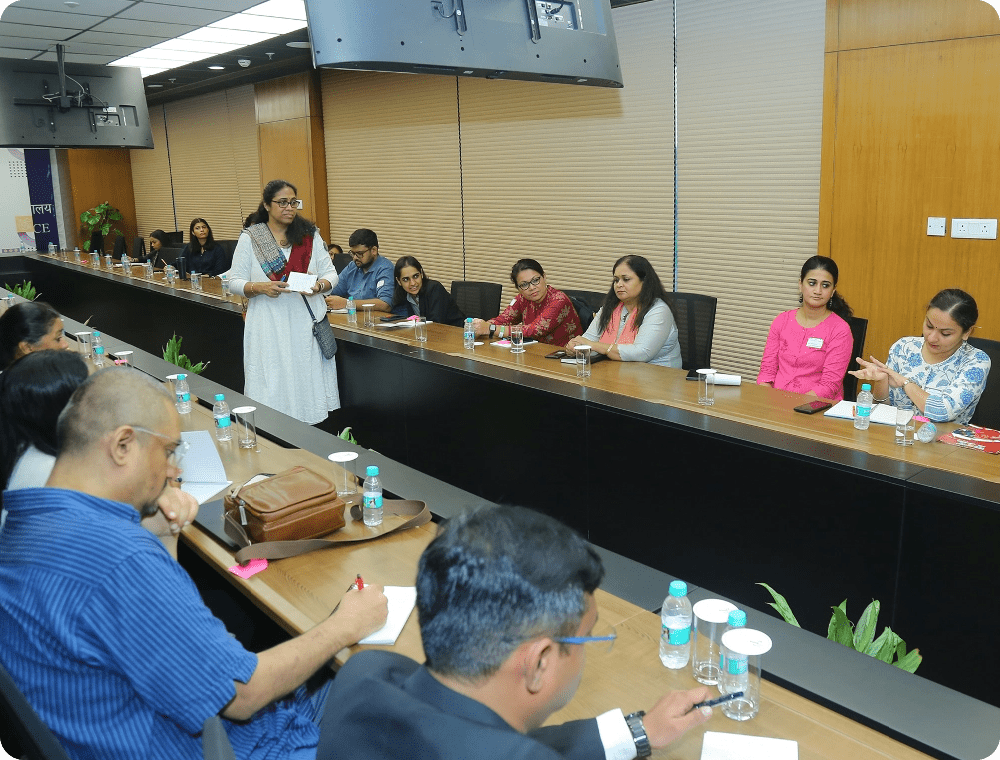
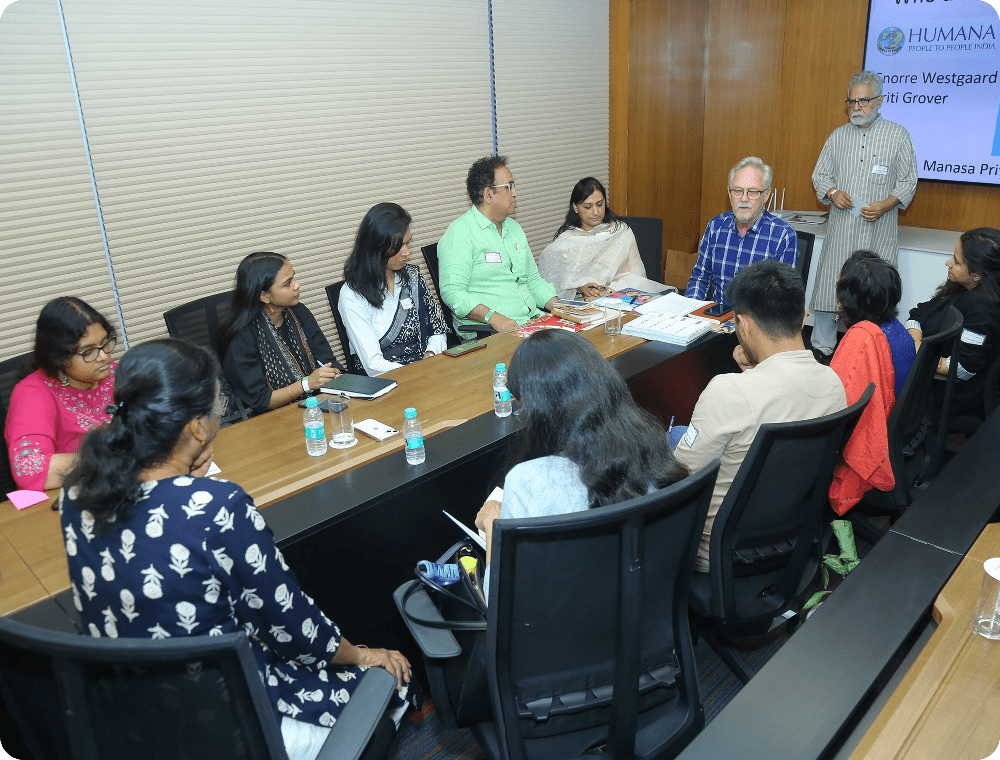
When it came to collaborations and partnerships, the focus was on shared values, clarity of purpose, strong communication, and commitment from all partners. The session highlighted the challenges and opportunities of collaborating with diverse organisations, emphasising the importance of continuous progress, goal alignment, and flexibility in achieving impactful outcomes.
Regarding data-driven decision-making, the sessions emphasised the creation of clear and concise dashboards to support informed decisions, alongside exploring the potential of AI-driven tools for dynamic interactions with data. The importance of data integrity, streamlined data collection processes, and actionable insights for human-centred decision-making were also stressed. The discussions surrounding leveraging technology, capacity building, and digital infrastructure for Micro, Small, and Medium Enterprises (MSMEs) highlighted the transformative potential of AI and no-code tools in enhancing social impact work. The sessions showcased opportunities presented by digital ecosystems to support local entrepreneurs and drive economic growth.
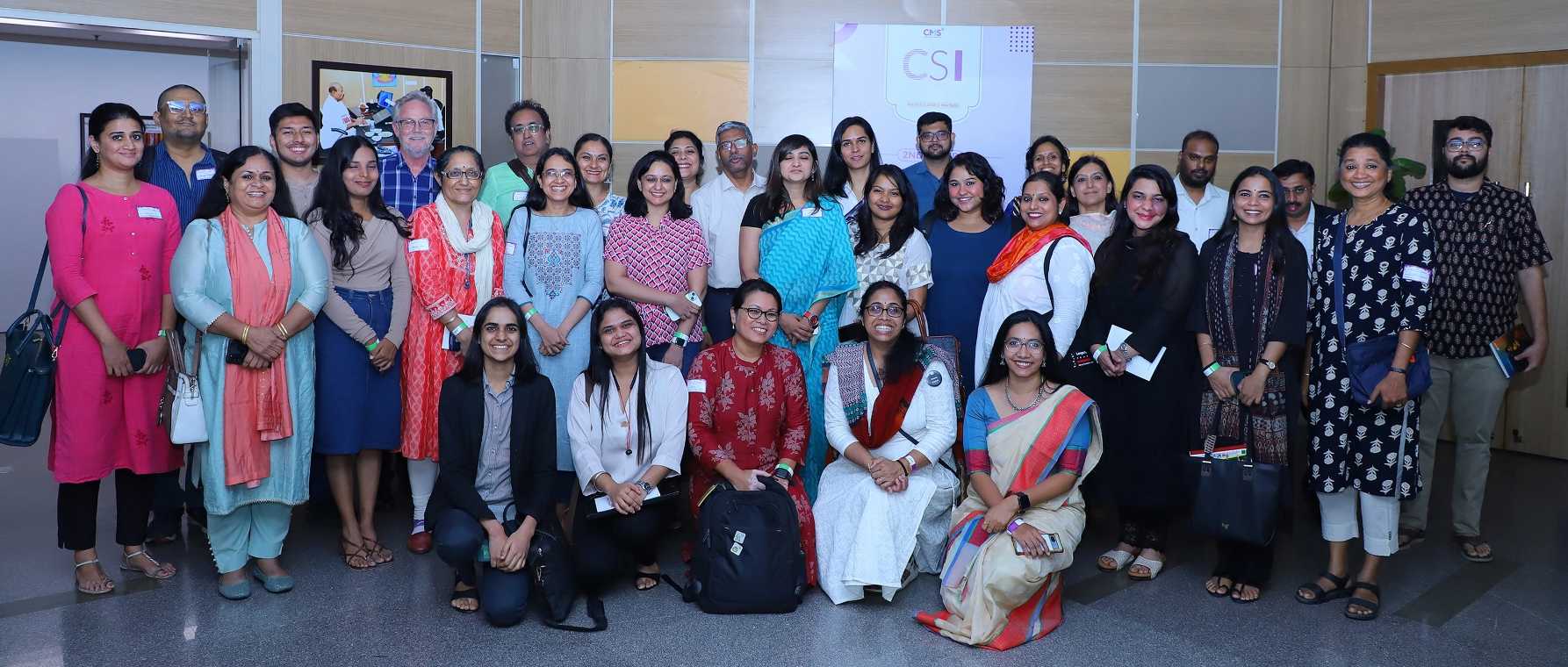
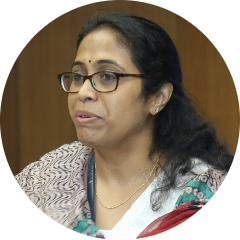
Shama Karkal
Catalyst Foundation

Anil Swarup
Former Secretary, Government of India

Engaging effectively with government entities to scale initiatives is a complex endeavour that requires careful consideration of various factors.
Key lessons from this session highlight the significance of understanding the nature of scale, which transcends mere numbers to encompass individual choices and geographical contexts. Successful scaling involves identifying and empowering agents of change who can catalyse transformation within governmental frameworks.
Building trust and confidence in government systems is crucial, necessitating visual outputs that clearly demonstrate change. The principles of leverage, the importance of culture over policy, and the need for continuous iteration stand out as foundational elements in this process. Additionally, developing a clear exit strategy is vital. Organisations should aim to transition from direct implementation roles to advisory positions, ensuring that changes are institutionalised for sustainability.
Engaging with government actors necessitates strategic relationship-building across various levels. Identifying champions within the government can significantly enhance collaboration, while regular communication and transparency are essential for fostering trust. A successful model highlighted was the School Innovation Marathon in Andhra, where early engagement and clear communication of efforts helped solidify partnerships.
Documentation plays a key role in maintaining clarity and accountability, preventing misunderstandings that could jeopardise relationships. Organisations should position themselves as co-creators rather than mere implementers, emphasising shared goals and collaborative efforts. Understanding the bureaucratic landscape, including the dynamics between different governmental ministries, is important for effective engagement.
A shift in narrative from confrontation to empowerment can help build confidence among government stakeholders. It is crucial to initiate programs at the district level to ensure they are embedded within existing structures. The articulation of a focused problem statement aligned with the relevant department’s interests can facilitate smoother collaboration.
Overall, scaling initiatives with the government is a gradual process that requires patience, persistence, and strategic positioning. Recognizing that success may take time is essential, as is the need to maintain high-quality relationships through regular engagement. By aligning organisational visions with government objectives from the outset, stakeholders can foster a collaborative environment conducive to long-term success. Emphasising unique value adds that complement existing government initiatives can further enhance these relationships, paving the way for impactful and sustainable change.


Vandana Nadig Nair
Co-Founder
Phicus Social Solutions

Shilpa Diwakar
Director and CEO
Phicus Social Solutions
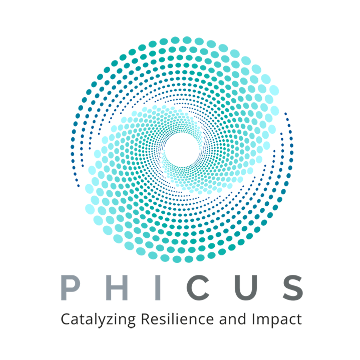
Mainstreaming capacity building (CB) is essential for creating resilient ecosystems that empower communities and organisations. The discussion emphasised that scaling an organisation involves not just increasing the size of its programs but also enhancing the institution’s overall capacity. Sustainable CB is crucial, especially in light of challenges faced during the COVID-19 pandemic, where innovative platforms were developed to support grassroots partners.
An AI assistant demonstrated how AI can enhance local capacity building by integrating technological prowess with a people-centric approach, simplifying complex concepts for better comprehension. Yet, it was recognised that while technology can enhance efficiency, there is a caution against over-reliance on advanced tools, which can stifle creativity. Instead, low-tech methods and innovative thinking should be prioritised to ensure that capacity building remains relevant and accessible.
Inclusivity emerged as another vital theme, highlighting the importance of addressing power dynamics within communities. This requires questioning existing barriers such as language and design, ensuring that capacity-building efforts are aligned with the specific contexts and needs of the target groups.
Funding remains a significant challenge, as capacity building often receives insufficient financial support. Organisations must improve visibility of their CB efforts and conduct thorough needs assessments to better negotiate funding with donors. Additionally, sustainability should be viewed from the recipient’s perspective, focusing on their needs and ensuring that ownership is fostered within communities.
In summary, successful capacity building requires a holistic approach that integrates innovative solutions, inclusivity, adequate funding, and sustainability, all while maintaining a human-centred focus. By redefining the CB landscape, organisations can enhance implementation fidelity and ensure quality outcomes in their initiatives.
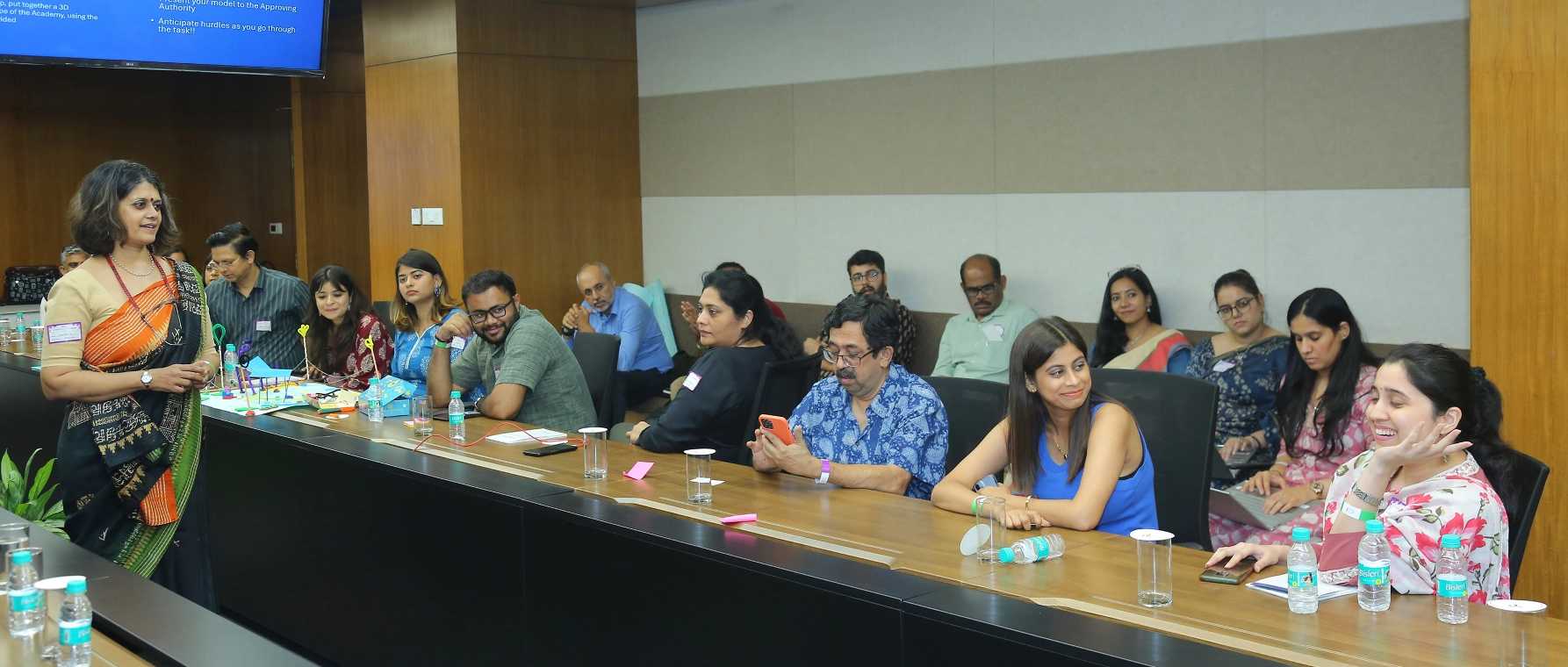

Vandana Nadig Nair
Co-Founder
Phicus Social Solutions

Navigating the intricate dynamics of managing diverse stakeholders, often likened to the challenging task of “herding cats,” reveals the complex dance of coordination and alignment required in collaborative efforts. This analogy captures the multifaceted nature of stakeholder engagement, where varying interests, objectives, and personalities must be harmonised towards a common goal.
As participants delved into the art of fostering collaboration and consensus among divergent groups, a clear theme emerged: the essence of effective leadership, communication, and adaptability in steering these dynamic interactions. The discussions illuminated the delicate balance of stakeholder management, emphasising the cultivation of trust, alignment of objectives, and cultivation of a shared vision to navigate the diverse landscape of interests towards collective progress.
Embracing the diversity of perspectives and strengths within stakeholder groups was underscored as a key enabler of innovation and sustainable outcomes. By harnessing the unique contributions of each entity and fostering a collaborative spirit rooted in mutual respect and purpose, the session highlighted the transformative power of inclusive and cohesive stakeholder engagement strategies.
In essence, the session provided a captivating exploration of the intricate challenges and rewarding strategies involved in orchestrating effective stakeholder management, painting a vivid picture of the strategic manoeuvres and empathetic leadership required to harmonise the varied voices and interests towards a harmonious symphony of collective action.
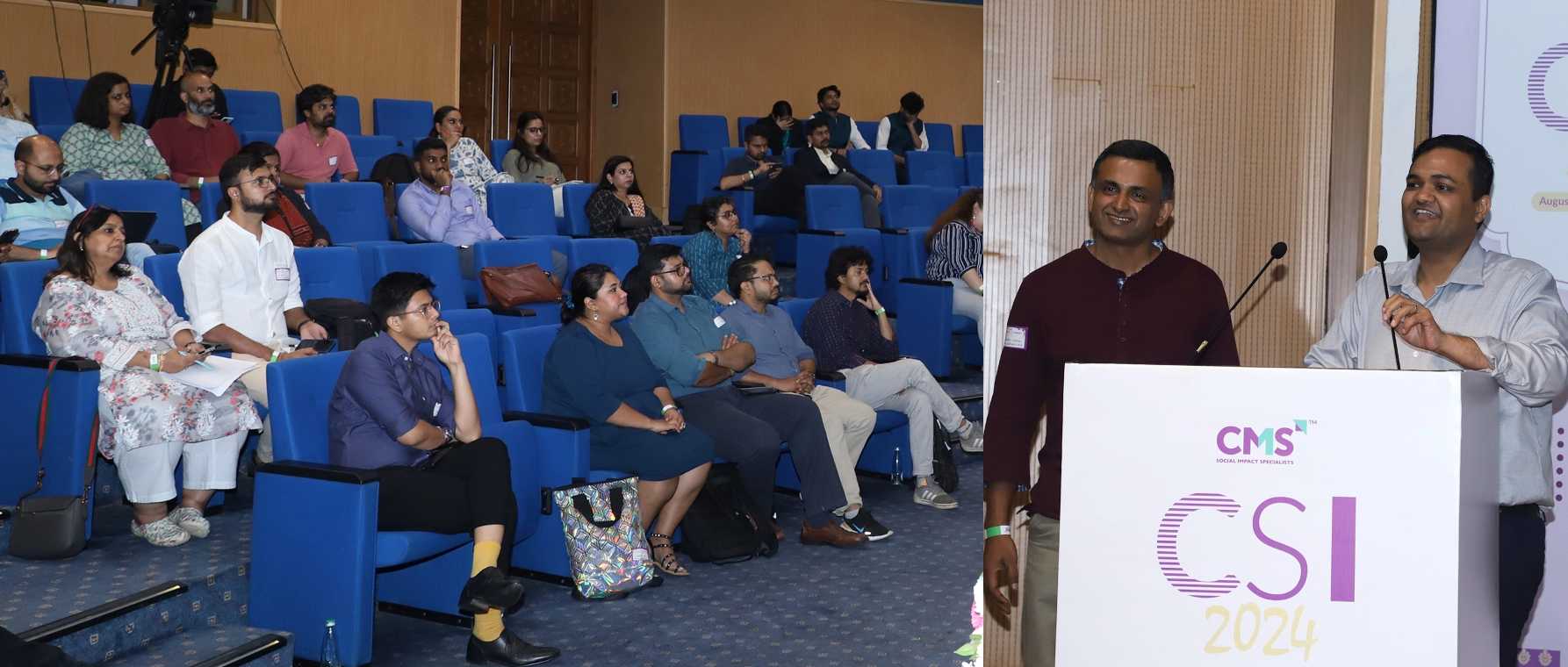
The exploration of "Data for Decisions and Stories" showed the vital role of dashboards in organisational decision-making; particularly, the importance of creating clear, concise visuals on dashboards to provide valuable insights without overwhelming users.
Participants were advised to define their audience, purpose, and key metrics before designing a dashboard, ensuring its effectiveness in tracking progress, identifying trends, and supporting decision-making. The focus remained on simplicity and power, enabling quick access to meaningful insights.
Different types of dashboards were explored during the session, showcasing customised tools to meet diverse stakeholder needs. Real-life examples demonstrated effective data structuring and visualisation techniques. The conversation also delved into the interplay between technology and human judgement, emphasising the essential role of human intervention in interpreting dashboard insights and guiding actions.
An intriguing glimpse into the future was shared, discussing the potential of AI-driven dashboards that enable interactive data exploration through chat interfaces. This innovative approach aims to simplify data inquiries, making decision-making more intuitive and dynamic. The significance of maintaining data integrity, optimising data collection processes, and focusing on relevant metrics was stressed to prevent system overload and ensure efficient use of resources and technology.
In essence, the session emphasised the importance of lean and purposeful dashboard design, grounded in actionable insights, effective design principles, and human-centric decision-making. A strategic approach to data collection, prioritising essential metrics, was highlighted to optimise resources and enhance decision-making processes efficiently.
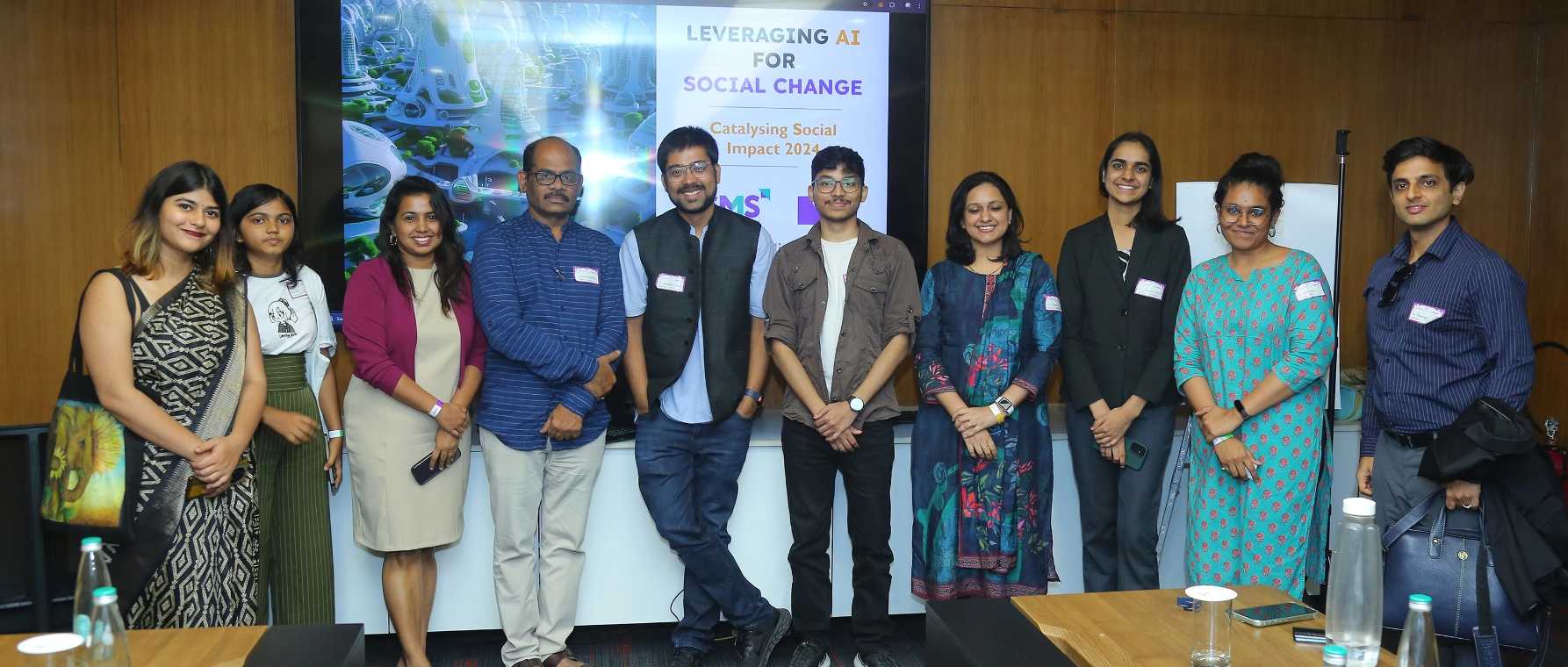

Shabbir Haider
Futurelab Studios

Madhavi Shapeti
BossMa


Technology and artificial intelligence (AI) offer transformative potential for enhancing implementation quality and fidelity across various sectors, particularly in social impact initiatives. The experts shared how the integration of AI and no-code platforms provides innovative solutions to common challenges such as resource constraints, data management, and scalability issues.
AI serves as a powerful tool to enhance human thinking and decision-making. By simulating conversations with historical figures or generating creative content like images and videos, AI expands the horizons of learning and creativity. Tools like Midjourney and Runway exemplify how AI can revolutionise creative processes, allowing users to generate high-quality images and videos through simple text prompts.
In the social impact sector, the application of AI and no-code tools like Airtable, Asana, and Trello streamlines project workflows and enhances data management. These technologies facilitate the creation of basic CRM systems and automate complex workflows, thereby improving project efficiency and communication. The integration of AI capabilities into such platforms promises even more advanced data analysis and automation in the future. No-code tools allow non-programmers to build data pipelines and CRMs. The session also explored practical use cases, including community engagement, feedback collection, and scaling impact.
Despite these opportunities, challenges remain in the widespread adoption of AI, including the high cost of access to powerful computing resources and the limited availability of AI models in non-English languages. Nevertheless, the rapid advancement of AI technology suggests a future where more inclusive and accessible solutions are possible.
The session highlighted India’s growing role as a hub for social impact initiatives and the transformative potential of AI and no-code solutions in this context. By contrasting traditional methods with modern technological approaches, the discussion underscored the rapid acceleration and accessibility of AI technologies, which promise to democratise access and accelerate innovation in the social sector.
Overall, the session emphasised the need for social sector organisations to explore and adopt these tools to boost efficiency, scalability, and impact, while staying mindful of data privacy and security concerns. It is also imperative to consider ethical implications and equitable access to ensure their benefits are maximised for all, across all sectors.
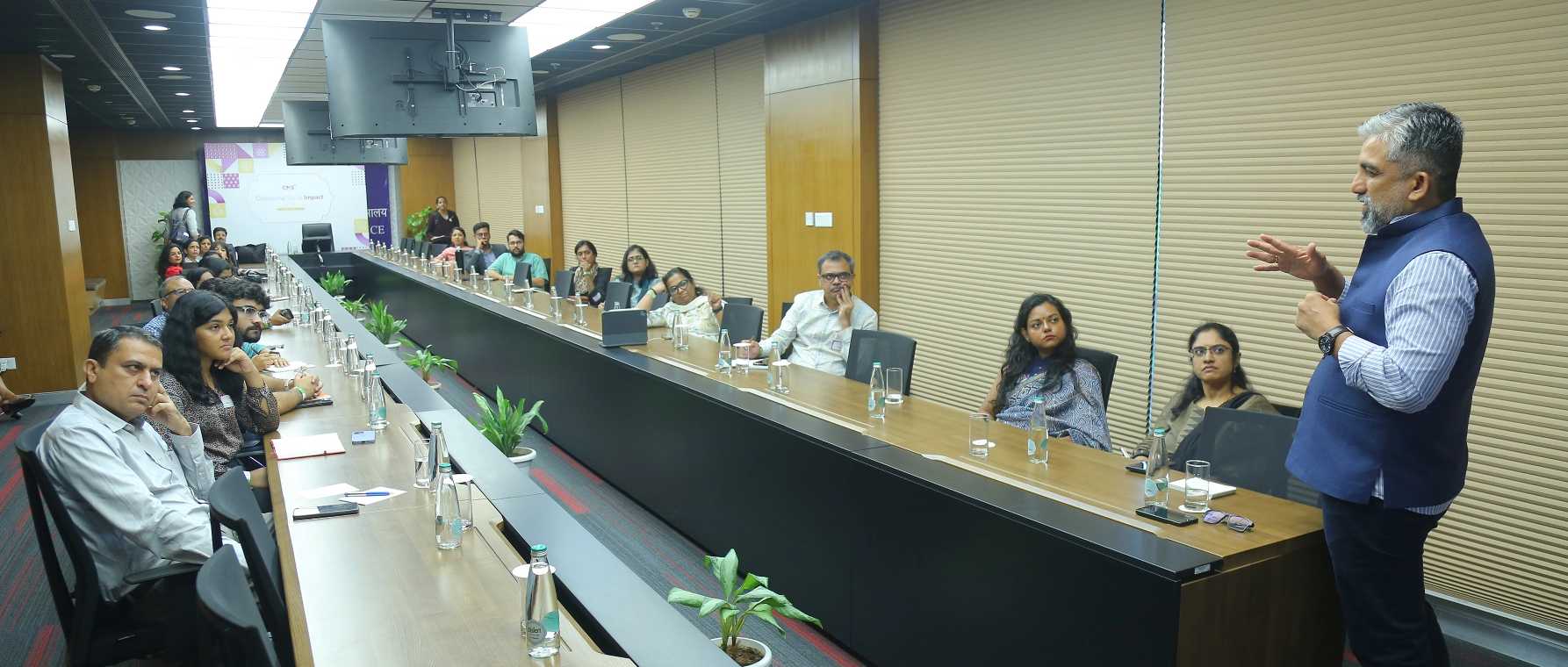

Kallan Gowda
Catalyst Management Services

Anand Arkalgoud
Socion

In scaling social impact initiatives, embracing complexity is crucial. The challenge lies not only in addressing individual problems but in tackling them at a scale that matches the growth of these issues. A key takeaway is the significance of defining problems clearly at scale and prioritising them effectively. This involves understanding the hidden aspects of challenges, much like uncovering the submerged parts of an iceberg.
Collaboration and data integration are central to achieving scale. The prevalent issue of siloed operations often hinders progress, highlighting the need for a unified approach where sectors work in harmony. Creating a common platform for data collection and analysis can transform isolated efforts into a cohesive mission, enabling better decision-making and resource allocation.
Empowering frontline workers (FLWs) as critical points of success is another vital aspect. By shifting the perception from last-mile workers to first-line changemakers, organisations can ensure these individuals are well-informed and equipped, fostering trust and accountability. This empowerment extends to simplifying data processes, turning data from claims into actionable facts, and mitigating fears related to resource adequacy and data complexity.
Innovative ideas, such as digital “passports” for FLWs, propose a standardised platform to integrate various programs, reducing the redundancy of multiple systems. This approach aligns with the concept of “digital nutrients,” providing essential tools and resources across sectors to strengthen the ecosystem as a whole.
Ultimately, the session underscores the importance of partnership with government entities that possess resources and decision-making power. Aligning goals with state aspirations can enhance program effectiveness and sustainability. By fostering an environment of continuous learning and adaptation, stakeholders can collaboratively shape agendas, address complexities, and ensure that scaling is not merely about expansion but also about impactful and sustainable growth.
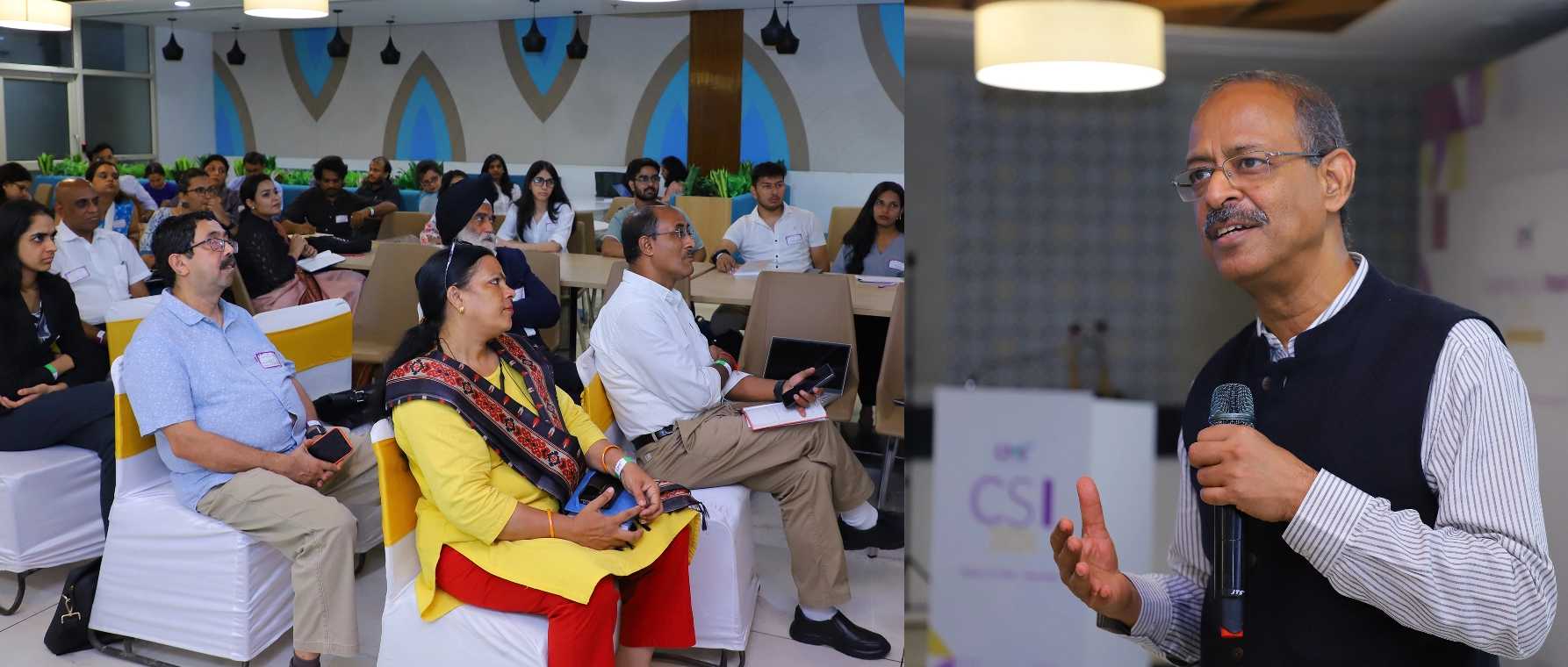

Binali Suhandani
Idearoots

Anil Swarup
Nexus of Good

Building capacity for partnership between the government and the social sector is crucial for delivering citizen-centric services. The focus is on transforming civil servants’ mindsets to prioritise accountability and learning from citizens. This transformation, however, requires patience, as meaningful change is expected to take time.
The session discussions highlighted the shift from a state-centric provider model to a facilitator role, emphasising the importance of collaboration with civil society. This approach aims to reduce power asymmetry and foster “Jan Bhagidari” (people’s participation). The transition from a rule-based to a role-based approach, known as “Karamyogi,” is central to this capacity-building effort. It focuses on being future-ready and deploying emerging technologies for self-reliance and accountability.
Challenges include addressing the middle tier of civil servants, where resistance to change is often most pronounced. Programs like Dakshata are being developed to enhance knowledge partnerships and bridge gaps across different levels of governance. The importance of expanding training efforts beyond IAS officers to include state cadre and urban local bodies was also emphasised.
The session underscored the need for patience in seeing results, as the transformation of the state into a more citizen-friendly entity is a long-term endeavour. Panelists also stressed that the civil servants become more accountable to citizens, thus creating a stronger, more responsive state.
Overall, the session acknowledged the necessity of mutual understanding and trust between the government and civil society. By leveraging collaborative efforts and focusing on comprehensive capacity building, both sectors can work together more effectively to meet the needs of the public.


Madan Padki
Head Held High Foundation

Anil Swarup
Nexus of Good


Focusing on transforming district economies through digital public infrastructure, this session emphasised fostering local growth and inclusivity via digital platforms.
Participants explored the potential of district economies, citing examples like Mandya, and considered how to redistribute wealth more equitably. They highlighted the importance of decentralised, grassroots-driven models, such as cooperatives and digital enterprises, in empowering MSMEs and rural entrepreneurs. Key challenges included access to financial data, branding, and infrastructure, particularly for women entrepreneurs, while also recognizing the role of emerging technologies in overcoming these barriers.
Three central themes emerged: the necessity of digital inclusion and infrastructure development to support local entrepreneurs; the critical role of cooperatives and community-driven governance in fostering sustainable growth; and the opportunities presented by digital public infrastructures (DPIs) to enable MSMEs to scale and connect to larger markets. Models like UPI and ONDC were highlighted as examples of creating digital ecosystems that support local producers, enhance financial inclusion, and drive sustainable development at the district level.
Participants discussed challenges such as inadequate financial data for lending, lack of local branding, and digital inclusion gaps. They advocated for grassroots-driven economic growth through digital cooperatives, where producers own and control the digital infrastructure. Leveraging open networks like UPI and health/agri stacks can drive local entrepreneurship and improve wealth distribution.
The vision for 2034 includes self-sustaining, climate-resilient, and digitally empowered communities. Proposals included creating a trustee venture fund and tokenizing digital entrepreneur participation to accelerate district economies, fostering financial inclusion and sustainable growth. Strategies to unlock entrepreneurial potential in underserved districts involved forming partnerships among MSMEs, government bodies, and non-profits, promoting regional brands, and establishing decentralised networks for services and products. The session concluded with action items such as creating thought papers, convening working groups, and leveraging platforms like the Karnataka Digital Economy Mission to scale district economies and discover district-based unicorns.